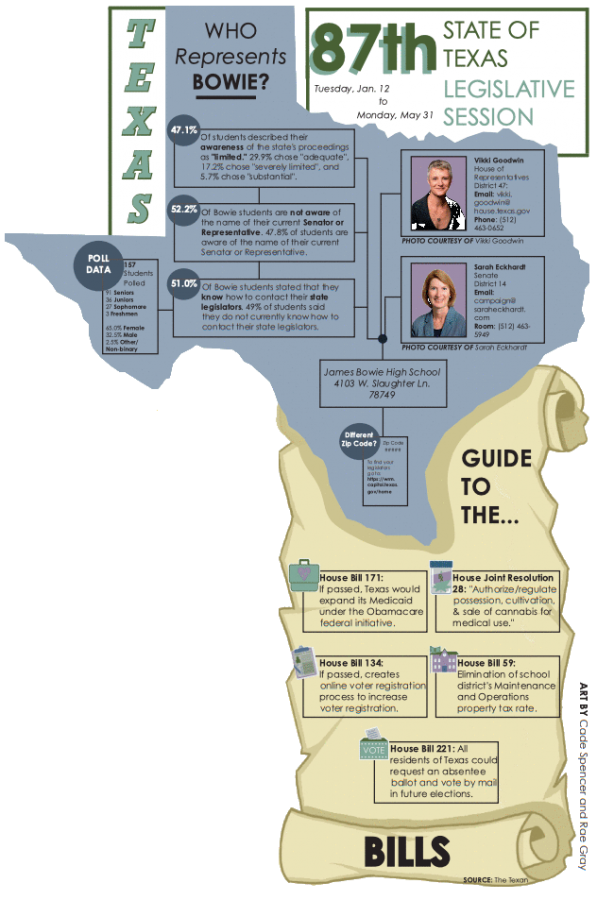State legislative session commences
Senate and House reconvene with three priorities: budget, redistricting, and pandemic
Art by Cade Spencer and Rae Gray
As of Tuesday, Jan. 12, all members of the Texas Congress reconvened remotely or in-person for the 87th Legislative Session.
April 7, 2021
Just an 18-minute car drive from campus, the Capitol stands as the center of Texas’ democracy and political establishment. Traditionally, inside the building’s chambers, 181 representatives and legislators make decisions and pass policies that impact all 29 million citizens of the state.
As of Tuesday, Jan. 12, all members of the Texas Congress reconvened remotely or in-person for the 87th Legislative Session.
“Texas is the model for bipartisan cooperation for the rest of the country, whether they realize it or not,” Legislative Director for Democratic House Representative Alex Dominguez, Logan Davidson said. “It is an exciting time to be a Texas Democrat because the appetite for bipartisan action and discussion has probably never been greater.”
According to the Texas Tribune and Davidson, the emphasis on bipartisanship can be attributed to the prevalence of three main legislative priorities that require immediate attention: the budget, redistricting, and COVID-19 response. As of Thursday, Feb. 11, Texas has had a total of 2,534,369 individual COVID-19 cases and 40,340 COVID-19 related deaths.
“I think the State Congress should prioritize COVID-19 right now,” sophomore Marissa Morales said. “Specifically, [they should] focus on vaccine distribution because it is the most pertinent as COVID-19 is at an all time high.”
Extending beyond vaccine distribution, the legislators are tasked with pressing issues related to COVID-19 including: the future and budget of the public education system, and the financial support allotted to the Texas Department of State Health Services.
“Legislators and representatives need to work together and act fast,” Morales said. “Even if they do not agree, they still need to be able to be bipartisan and get stuff done.”
Closely related to COVID-19, another major priority of the session is the state budget. According to the Texas Tribute, Texas Comptroller Glenn Hegar estimates that Texas lawmakers will have $112.5 billion to formulate the general spending budget for the next two years. Currently, legislators have proposed a plan that requires $119.7 billion in funds.
“From the budget perspective, the current proposal exceeds the amount of funds available, so it is about balancing things,” Davidson said. “We are going to have to really read into who needs the funds, such as public education or standing health care.”
The final session priority is redistricting, where lawmakers ensure that state congressional districts are appropriate based on the demographic data collected in the 2020 Census. If there are no delays, the census information should be introduced into the legislature by April 1.
“Redistricting this session is really interesting because in the past, Republicans have used it to draw hard red districts,” Davidson said. “The big issue now in redistricting is if the Republican majority will draw partisan lines or more true demographic districts.”
Beyond the session priorities, 2,838 individual bills have been introduced in either the House of Representatives or the Senate since the session’s initiation. Within the bills are legislation for funds for statewide accessible-for-all playgrounds and reform of the state holiday Confederate Heroes Day.
“There are many significant bills that I am excited to watch this session,” Davidson said. “We are in the middle of a pandemic, and thus, I think we will see major pieces of legislation that deal with the expansion of healthcare access, specifically Medicaid.”
In a poll taken by the Dispatch, 68.2 percent of Bowie students stated that COVID-19 should be the primary focus of the 87th Legislative Session followed by 14.6 percent of students who placed prominence on civil and human rights.
“Beyond COVID-19 and the economy, I think more focus of the Texas state government should be on environmental issues,” senior Reya Lashinger said. “Especially the consideration of transitioning to renewable resources and making initiatives for lower carbon emissions.”
If any additional individual bills are to be introduced, they must meet the deadline for unrestricted filing of bills and joint resolutions of Friday, March 12.
“We have a government of the people, for the people, and by the people,” Davidson said. “It is very important for people to be involved in the state government: contact a representative, advocate, testify, or participate in any way.”
In a poll issued by the Dispatch, students indicated that 50.3 percent of them identified that it is “important and necessary” for students to be aware of and involved in the proceedings of the Texas state legislature while 44.6 percent of students labeled it as “important, not necessary.”
“The state government can attract the involvement of young students through social media platforms and a greater advertisement of their initiatives,” Lashinger said. “They can also address young people as greater stakeholders in the issues presented and consider their viewpoints on these issues.”
As of now, the 87th legislative session will conclude on Monday, May 31.
“Fundamentally, I think anyone who wants to be involved in state government should and can be involved,” Davidson said. “It is important to get involved because you are affected by what happens in the legislature, and it has a personal impact on all of our lives.”











